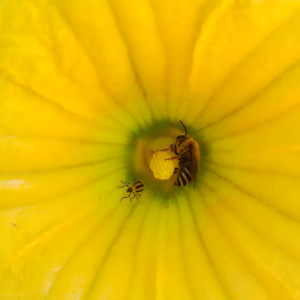HOME PREVIOUS ARTICLE NEXT ARTICLE
By Susan Willis Chan, University of Guelph
A new OMAFRA-funded project out of the University of Guelph is underway to develop an integrated pollinator-pest management (IPPM) cell phone app for growers of cucurbit crops, especially pumpkin, squash, and zucchini. The initial version of the app will be rolled out in the spring of 2023 for trial use by Ontario growers.
Cucurbit growers are especially aware of the role of bees in crop pollination because cucurbits have separate male and female flowers, and the heavy pollen produced on the male flowers cannot be moved by wind to the female flowers. With inadequate pollination, most cucurbit crops abort their fruit or produce misshapen, unmarketable fruit. Research has shown that on most farms in Ontario both wild bees and managed honeybees visit cucurbit crop flowers. Having a suite of bees visiting cucurbit crops provides resilient pollination services in case of losses of managed bees such as was seen in 2022 when 50% of honeybee colonies died over the winter in Ontario. Furthermore, honeybees are not always the best pollinators of these crops. Scouting for pollinators on cucurbit crop flowers allows growers to understand how robust and resilient their crop pollination services are and make pollination management decisions.

An illustration of the importance of managing both pollinators and pests in cucurbit crops. Shown here are an important wild pollinator (squash bee) and an important pest (cucumber beetle) together on a pumpkin flower.
Besides managing pollinators in their crops, cucurbit growers need to manage the insect pests and the diseases that reduce yield or in some cases cause crop failure. Although insect pests can be controlled with pesticides, there is a fundamental dilemma for growers because the pesticides they use may have a negative effect on the pollinators they depend on to set fruit in these crops. One approach to dealing with this dilemma is to use integrated pest management (IPM). Integrated pest management uses a variety of techniques to protect crops from insect pests while reducing pesticide use. An integral part of IPM is the use of established economic thresholds based on pest density in the crop that help growers manage pesticide applications. The use of IPM depends upon scouting for pests in cucurbit crops to determine the pest insect densities on the crop. Some insect pests such as cucumber beetles are found in the crop flowers where pollinators are also found.
The app being developed by the University of Guelph will allow growers to scout simultaneously for insect pests and crop pollinators on their cucurbit crops. The app will provide information back to growers about pest pressure, IPM pesticide application thresholds, and the abundance and resilience of their pollinator populations, with suggestions about how to increase pollination resilience tailored to each farm and crop.
App development is dependent upon the expertise brought by professionals in the fields of crop production, pesticides, IPM, and pollinators. This expertise is being provided by a collaboration among researchers at the University of Guelph (Dr. Nigel Raine, Dr. Susan Willis Chan) and Pollinator Partnership Canada (Dr. Lora Morandin), by the OMAFRA Cucurbit Crop Specialist (Elaine Roddy), by Geoffrey Campbell and Brett Crowley for the user interface design and technical development, with input from producer organizations (Fresh Vegetable Growers of Ontario (FVGO), Ontario Processing Vegetable Growers (OPVG)) and crop scouts working with cucurbit growers. Dissemination of information on the app to growers will be coordinated through a collaboration with The Ontario Soil and Crop Improvement Association (OSCIA) and FVGO and OPVG.
However, there is an important role for individual growers in the development of the app. The project expects to roll out the initial version of the app by the spring of 2023 and is looking for growers to test it in the field on their cucurbit crops and to provide feedback. Using that feedback, the app will be modified and improved, making it better for all cucurbit crop growers in the province. Other scouting options such as hard copy or online forms are available to growers who prefer those methods.
For more information about this project and to participate as a tester, please contact Susan Willis Chan at: dchan05@uoguelph.ca.
HOME PREVIOUS ARTICLE NEXT ARTICLE
